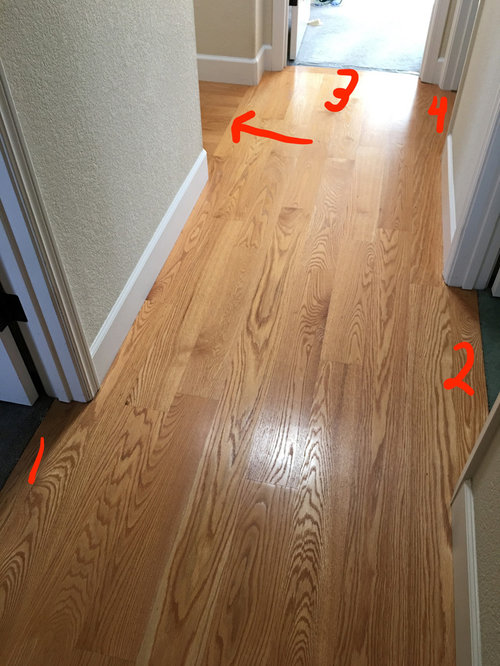Imagine yourself stepping into your newly renovated kitchen, the warm glow of the morning sun reflecting off the beautiful vinyl plank flooring. The space feels fresh, inviting, and perfectly complements your modern decor. But have you ever pondered the thickness of those planks? Many people don’t, focusing solely on color, texture, and style. However, the thickness of vinyl plank flooring holds a significant role in its performance, durability, and longevity. Understanding this factor can make all the difference in creating a floor that stands the test of time and brings lasting joy to your home.

Image: mromavolley.com
This guide delves into the depths of vinyl plank thickness, uncovering the secrets behind its importance. We’ll unravel the mysteries of wear layers, core constructions, and how these factors impact the floor’s overall performance. Armed with this knowledge, you can confidently choose a flooring that aligns perfectly with your lifestyle, budget, and expectations.
Unveiling the Importance of Thickness
Vinyl plank flooring, with its versatility and cost-effectiveness, has become a favorite among homeowners. But unlike solid hardwood, which gets thinner with each sanding, vinyl plank flooring’s thickness often gets overlooked. Many assume all planks are created equal, but the truth is, thickness plays a crucial role in the following aspects:
- Durability: A thick wear layer provides superior protection against scratches, dents, and fading, ensuring a floor that looks beautiful for years to come.
- Stability: A thicker core construction provides enhanced stability, preventing warping, buckling, or cupping, especially in areas with fluctuating temperatures or humidity.
- Sound Insulation: For those seeking a quieter living environment, thicker vinyl planks often offer superior sound absorption, minimizing noise from foot traffic and the floor below.
- Water Resistance: Although many vinyl planks are waterproof, thicker options tend to have a more robust seal against moisture, making them ideal for kitchens, bathrooms, and other areas prone to spills or leaks.
- Subfloor Imperfections: Thicker planks can better conceal minor imperfections in your subfloor, creating a smoother, more even surface.
Understanding the Components: Wear Layer & Core Construction
The thickness of vinyl plank flooring is determined by two primary components: the wear layer and the core construction. Let’s explore these elements in detail:
1. Wear Layer:
- This is the top layer that protects your floor from the everyday wear and tear of foot traffic, furniture, and spills. The thicker the wear layer, the more durable and scratch-resistant the plank becomes.
- Look for wear layers ranging from 4 to 6 mil (millimeters) for residential applications and 8 to 12 mil for commercial settings, which receive higher foot traffic.
- A thicker wear layer also offers enhanced stain and fade resistance, protecting the beauty of your flooring for years to come.
2. Core Construction:
-
This refers to the internal structure of the vinyl plank, providing support and stability. This layer directly impacts the floor’s durability, sound absorption, and ability to handle uneven subfloors.
-
There are three main types of core constructions:
- Solid Vinyl: Offers superior durability and stability, often used in high-traffic areas due to its strength.
- Composite Core: A more affordable option, utilizing a combination of materials like PVC and fiberglass for structural support.
- WPC (Wood Plastic Composite): Incorporates wood particles for enhanced sound absorption and a natural feel underfoot.
-
The thickness of the core construction directly influences the overall thickness of the vinyl plank. A thicker core, while adding to the plank’s cost, provides better stability, sound absorption, and subfloor imperfection concealment.
Choosing the Right Thickness for Your Needs
Determining the ideal thickness for your vinyl plank flooring boils down to a few key considerations:
- Your Lifestyle: Are you a family with active children and pets, or do you live in a quieter household? High-traffic lifestyles call for thicker planks with a durable wear layer.
- The Location: Will the flooring be installed in a high-traffic area like a kitchen or entryway or in a less-frequented space like a guest room? High-traffic areas benefit from thicker planks for added durability.
- Your Budget: Thicker vinyl planks generally come at a higher price, so factor your budget constraints into your decision.
- The Subfloor: Are there any noticeable imperfections in your subfloor? Thicker planks can help conceal slight irregularities, creating a smoother surface.
- Sound Absorption: Are you concerned about noise levels in your home? Thicker planks, especially those with a WPC core, offer better sound absorption, reducing noise from foot traffic.

Image: viewfloor.co
Expert Insights for Informed Decisions
Here are some insights from flooring professionals to help you navigate the world of vinyl plank thickness:
- “Always consult with a flooring specialist before making a final decision. They can assess your specific needs and recommend the optimal thickness for your application.” – Jennifer, Flooring Specialist at Home Depot
- “Don’t solely focus on the initial cost, think long-term. Investing in a thicker plank often means greater durability and longevity, saving you money in the long run.” – John, Architect at Design Build Associates
Does Thickness Of Vinyl Plank Flooring Matter
Conclusion
The thickness of vinyl plank flooring may seem like a minor detail, but it significantly impacts its performance, durability, and longevity. By understanding the role of wear layers, core constructions, and their various types, you can make an informed choice that aligns with your needs and style. Remember, selecting the right thickness isn’t about finding the thickest option; it’s about finding the perfect balance between durability, stability, budget, and your individual requirements.
So, as you embark on your flooring journey, don’t hesitate to take the time to explore the thickness option. After all, you’re investing in a long-lasting and beautiful addition to your home – a decision you’ll appreciate for many years to come.






